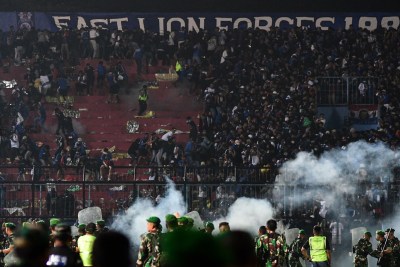JAKARTA – Riot police firing billowing clouds of teargas are being blamed for triggering a stampede at an already emotionally-charged football game in East Java that killed at least 135 people in Indonesia’s worst-ever sporting tragedy.
It ranks as the world’s second worst football disaster after Peru’s Estadio Stadium bloodshed in May 1964 when 328 spectators were killed under similar circumstances after an unpopular decision by the referee exploded into violence.
Teargas also figured in the deaths of 120 people during a stampede in the main stadium in Accra, Ghana in May 2019, but a hailstorm was responsible for what was previously the worst Asian football disaster in Nepal in 1988 that left 90 fans dead.
The shocking events on October 2 unfolded at Malang’s over-crowded Kanjuruhan stadium after the local Arema FC team lost 3-2 to bitter rivals Persebaya from the neighboring port city of Surabaya, 96 kilometers to the north.
Media reports say in an example of the tribalism that always generates such heat at Indonesian football matches more than 3,000 disappointed fans invaded the pitch, attacking police and vandalizing facilities.
But when police responded by firing teargas into the stands, hysteria broke out among the 40,000 spectators who made a mad rush for the single exit. Most of the victims died from either asphyxiation or were trampled underfoot.
President Joko Widodo ordered the All-Indonesian Football Association (PSSI) to temporarily suspend the popular Liga 1 competition until officials have evaluated and improved security procedures at the country’s grounds.
Political coordinating minister Mahfud MD told reporters that 42,000 tickets were sold for a stadium with a listed capacity of 38,000, but most human rights groups said they believe an excessive use of force led to the disaster.

FIFA, the world’s governing body of association football, prohibits the use of teargas at stadiums in Article 19 (b) of its Stadium Safety and Security Regulations.
Football officials fear that safety concerns may now persuade FIFA to take away Indonesia’s right to host the Under-20 World Cup, which is planned for May to July next year.
Reacting to the Malang tragedy, FIFA President Gianni Infantino said in a statement: “This is a dark day or all involved in football and a tragedy beyond comprehension.”
Police are already under a cloud over a sensational case last July in which a two-star general in charge of internal affairs directed the execution of one of his aides for reasons which are still the subject of speculation.
Even sources close to the police are unaware of the motive and say although the general will now stand trial for the murder, they doubt whether the real motive will ever be known.
Riots among rival fans are common in Indonesia, but in recent years there have been few serious incidents. Witnesses say even the Malang game had been played in good spirit until the pitch invasion.
“There should be a priority focus on holding accountable both the police commanders, as well as rank-and-file officers, who decided to fire significant and excessive amounts of teargas,” said Phil Robertson, deputy Asian director of Human Rights Watch, said in a statement.
He also said there was an urgent need for Widodo to establish an independent and impartial investigation to get to the bottom of the tragedy that attracted international headlines as soccer-mad nations prepare for the 2022 World Cup in Qatar in November.

